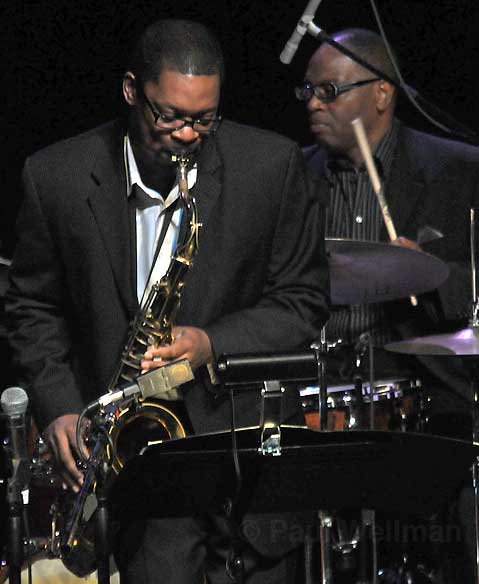The Blue Note 7
At UCSB's Campbell Hall, Wednesday, January 21.

Like the S.F. Jazz Collective, the Blue Note 7 re-creates the excitement of the classic post-bop of the 1950s and 1960s with tremendous integrity and soul, and without slavish imitation or heavy-handed remixing. At the core of both groups are great arrangements, many of them by Bill Charlap and Renee Rosnes-top jazz pianists who also happen to be husband and wife. This is Charlap’s gig (Rosnes plays with S.F. Jazz), but the Blue Note 7 are using some of Rosnes’s arrangements, along with those of Charlap, drummer Lewis Nash, and alto saxophonist Steve Wilson. Part of the concept of this tour is that members of the all-star group will write more new charts based on the Blue Note catalogue, so expect to hear from them soon.

Nash was soloing on the title track from Blue Note 7’s album Mosaic as I arrived. It’s a Cedar Walton composition that has come to stand for what the group is trying to do-play this music at maximum intensity without losing touch with its jagged individualism. Nash truly “swings you into bad health,” as leader Charlap put it, describing the drummer’s fluid, driving sound. Next up was a composition by vibraphonist Bobby Hutcherson called “Little B’s Poem,” arranged by Wilson and featuring him on flute. Bassist Peter Washington, guitarist Peter Bernstein, and Charlap all contributed to the song, one of the most successful pieces of the night. Tenor Ravi Coltrane told the audience about growing up near Santa Barbara, and how he hung out on State Street when he was a “conservative” college student (which I’m pretty sure was a joke). Jackie McLean was always a Blue Note stalwart, and his “A Ballad for Doll” featured both trumpeter Nicholas Payton, who sorted things out with some sophisticated slurs, and Steve Wilson, this time on alto. The group achieved great unison sonority on this number, showing just how far things have come in the appreciation of this music. Thelonious Monk’s brilliant “Criss Cross,” arranged by Wilson, was another triumph, unexpected and uplifting in all the right places, with a great spot for Peter Washington to stretch out. The final two numbers, Freddie Hubbard’s “Hub-Tones,” which had (of course) another great Payton solo, and Dexter Gordon’s “Soy Califa,” took the house to somewhere close to jazz heaven.



